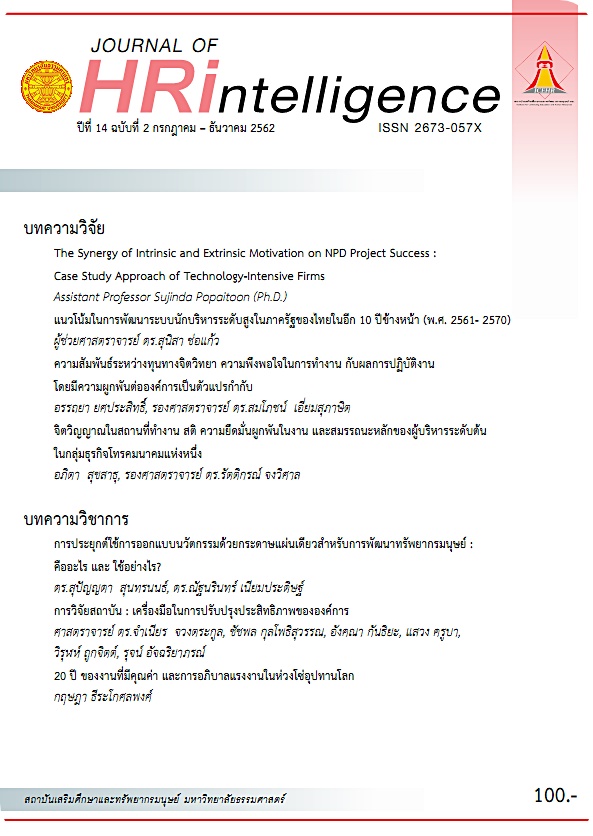Workplace Spirituality, Mindfulness, Work Engagement and Core Competency of First-line Managers in a Telecommunications Business Group
Main Article Content
Abstract
This research is Quantitative Research that has three objectives: 1) study the level of workplace spirituality, mindfulness, work engagement and core competency of first-line managers in a telecommunications business group 2) to study relationship between workplace spirituality, mindfulness, work engagement and core competency of first-line managers in a telecommunications business group, and 3) study the effect of workplace spirituality, mindfulness, work engagement and core competency of first-line managers in a telecommunications business group. The sample of this research were 170 first-line managers in a telecommunications business group. Data were analyzed with a computer program. The statistical method used to analyze the obtained data were percentage, mean, standard deviation, Pearson’s product moment correlation coefficient, and multiple regression analysis. The results of the research show the following: 1) first-line managers in a telecommunications business group contained a average level of mindfulness was at very high level, work engagement and core competency was at high level and workplace spirituality was at medium level; 2) workplace spirituality and work engagement were positively related to core competency with statistical significance; and 3) workplace spirituality, mindfulness, work engagement could predict core competency of first-line managers can predict 74.6 percent with statistical significance.
Article Details
ขอมอบลิขสิทธิ์บทความที่ได้รับการตีพิมพ์ให้แก่สถาบันเสริมศึกษาและทรัพยากรมนุษย์ กรณีมีการฟ้องร้องเรื่องการละเมิดลิขสิทธิ์เกี่ยวกับภาพ กราฟ ข้อความส่วนใดส่วนหนึ่ง และ/หรือข้อคิดเห็นที่ปรากฎในบทความ ให้เป็นความรับผิดชอบของข้าพเจ้าและผู้เขียนร่วมแต่เพียงผู้เดียว
References
Apinya H. (2016). Applied Statistics in Psychology. Bangkok : Kasetsart university publishers. (in Thai) Ashmon and Duchon. (2000). Spirituality at Work A Conceptualization and Measure. Journal of Management Inquiry, 9 (2), 134-145.
Baer et al. (2006). Using Self-report Assessment Methods to of Explore Facets Mindfulness. Journal of Personality and Social Psychology, 13 (1), 27-45.
Bangkokbiznews. (2013). How to adapt When the organization change. 10 December 2017, http://www. bangkokbiznews.com/blog/detail/520192
Digital Economy and Society. (2017). 7 Important Trends of Future Work. 26 December 2017, https://goo.gl/Zrz5wt Duchon, D. and D. A. Plowman. (2005). Nurturing the Spirit at Work: Impact on Work Unit Performance. The Leadership Quarterly, 16, 807-833.
Jariya B. (2009, June 25). Driving the organization to the goal. Prachachat business, 38. (in Thai)
Joan F. (2008). Spiritual performance from an organizational perspective : the Starbucks way. The international journal of business in society. 8, 248-257.
Jochen et al. (2017).The Mediating Role of Emotional Exhaustion in the Relationship of Mindfulness with Turnover Intentions and Job Performance. Journal of Managerial Psychology, 8, 707-716.
Kabat-Zinn. (2003). Mindfulness-based intervention in context:past, present, and future. Clin Psychol: Science and Practice, 144-156.
Krahnke, K., R. A. Giacalone and C. L. Jurkiewicz. (2003). Point-counterpoint : Measuring workplace spirituality. Journal of Organizational Change Management, 16 (4), 396-405.
Neal J. (1997). Spirituality in management education : A guide to resources. Journal of Management Education.12 (4), 109-118.
Netiya J. (2014). Antecedents of Engagement and Empowerment Impact on Job Performance and Organization Citizenship Behavior of Nursing Instructors of Boromarajonani College of Nursing, the Ministry of Public Health. Doctor of Education Educational Administrtion, Kasetsart University. (in Thai)
Nuttavoot P. (2018). HR Trend 2018. 21 April 2018, https://www.dst.co.th/index.php?option=com_content& view=article&id=1762:hr-trend-2018-management&catid=29&Itemid=180&lang=en
Oraphin C. (2014). An Analysis of Work Engagement construct. UMT-POLY Journal The Eastern University of Management and Technology, 11 (2), 75-79. (in Thai)
Panjaree J. & Phramaha Hansa Dh. & Poonsuk M. (2018). An Application of Mindfulness to Develop Manufacture Labour’s Work with Happiness : A Case Study of Continental Knitting Ltd., Part. Journal of MCU Peace Studies Mahachulalongkornrajavidyalaya University, 6, 171-181. (in Thai)
Patpong V. (2014). Google Search Engine America's giant Use "Mindfulness" to find yourself. 22 October 2017, https://mgronline.com/dhamma/detail/9570000061337
Pawinee P. (2014). Insight Meditation, Workplace Spirituality and Employee Engagement. The Thailand research Fund and The University of the Thai Chamber Commerce. (in Thai)
Petchsawang and Duchon. (2012). Workplace spirituality, meditation, and work performance. Journal of
Management, Spirituality & Religion, 9 (2), 189-208.
Petchsawang and McLean. (2017). Workplace spirituality, mindfulness meditation, and work engagement. Journal of Management, Spirituality & Religion, 14.
Rattigorn C. (2008). Human relations: Human behavior in the organization. Bangkok : Kasetsart university publishers.
Rattigorn C. (2017). The influence of workplace spirituality, spiritual health and leadership on organizational outcomes. Kasetsart Journal of Social Sciences, 38 (2), 1-15.
Rattigorn C. (2018). Organizational Psychology. Bangkok : Chula publishers.
Robbins, S. P. and T. A. Judge.(2007). Organizational Behavior. (12th ed). New Jersey : Pearson Education.
Schaufeli et al. (2002). The measurement of engagement and burn out : A two-sample confirmatory factor analytic approach. Journal of Happiness Studies, 71-93.
Schaufeli et al. (2006). The measurement of work engagement with a short questionnaire : A cross-national study. Journal of Educational and Psychological Measurement, 66 (4), 701-716.
Surachart P. (1997). Multivariate analysis techniques for social science research. Bangkok : Liangchiang publishers. (in Thai)
Thamonwan M. & Rattigorn C. (2011). Servant Leadership, Spirituality in Organization and Job Performance Of Managers in a Private Food Industry Business in Bangkok. Journal King Mongkut’s University of Technology North Bangkok, 21 (2), 447-455. (in Thai)
Thunvarat P. & Rattigorn C. (2010). Leadership, Organizational Culture, Workplace Spirituality and Organizational Engagement of Manager of Advanced Info Service Public Company Limited. Journal of Human Resources Intelligence, 5 (2), 32-41 (in Thai)
Tischler and Mckeage. (2002). Linking emotional intelligence. Spiritual and workplace performance. Journal of Manageriaal Psychology, 17 (3), 203-218.
Vaculik et al. (2016). Mindfulness, Job Satisfaction and Job Performance : Mutual Relationships and Moderation effect. Journal of International Scientific Conference Economics and Management, 21 148-156.
Wipada K. (2012). Roles and importance of leadership.15 December 2018, https://www.gotoknow.org/posts/345480
Wullop S. (2010). Mindfulness at work for success in work life 1: Principles of thinking and direction. 28 December 2017, http://share.psu.ac.th/blog/fnr-devolop/14271
Yongxing et al. (2017). Work engagement and job performance : the moderating role of percrived organizational support. Journal of anales de psicologia, 33 (3), 708-713.
Yongyud W. (2015). Mindfulness in Organization. Department of Mental Health, Ministry of Public Health. (in Thai)

